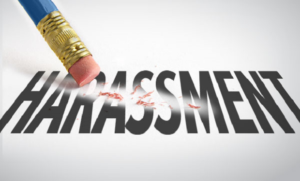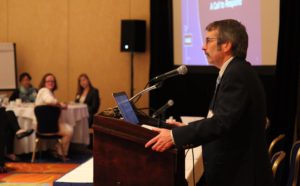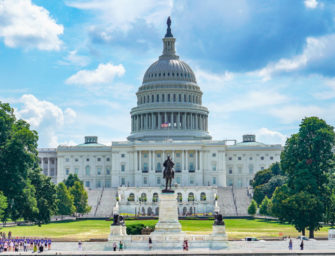A Revised Ethics Policy: Setting the Bar High to End Harassment in the Sciences
By Eric Davidson, AGU President, Robin Bell, AGU President-elect, and Margaret Leinen, AGU Past President
Science is strongest when a diverse set of voices are not only allowed, but encouraged, to share their perspectives and scientific ideas. Harassment and discrimination can negatively impact that diversity of voices and have no place in a research environment or workplace of any kind. They compromise open communication, create a hostile work climate, and in doing so, undermine the entire global scientific enterprise. While regulatory and legal protections already exist in the workplace, at AGU we strive to live up to our values in the way that we treat each other and our colleagues both within our own institutions and around the world. We’ve seen and heard of too many instances, stories, and studies that show harassment in the sciences is happening and that the problem is significant. When we heard from you, our members, that you wanted AGU to set clear expectations around behavior we set out to update our policy accordingly.
 We are pleased to share that AGU’s Board has adopted an updated Ethics Policy as of 14 September 2017, after a little more than a year of work by our Ethics Task Force. This policy takes a much stronger stance against harassment by including it in the definition of research misconduct and expanding its application to AGU members, staff, volunteers, and non-members participating in AGU-sponsored programs and activities including AGU Honors and Awards, and governance. The purpose of these updates is to address persistent ongoing issues of harassment, discrimination, and bullying within the sciences. By establishing and enforcing these code of conduct expectations in our updated policy, AGU can provide another tool for the scientific community to educate and to raise awareness on how to change culture, behavior, and address these issues.
We are pleased to share that AGU’s Board has adopted an updated Ethics Policy as of 14 September 2017, after a little more than a year of work by our Ethics Task Force. This policy takes a much stronger stance against harassment by including it in the definition of research misconduct and expanding its application to AGU members, staff, volunteers, and non-members participating in AGU-sponsored programs and activities including AGU Honors and Awards, and governance. The purpose of these updates is to address persistent ongoing issues of harassment, discrimination, and bullying within the sciences. By establishing and enforcing these code of conduct expectations in our updated policy, AGU can provide another tool for the scientific community to educate and to raise awareness on how to change culture, behavior, and address these issues.
We believe that AGU is on firm ground in defining harassment as scientific misconduct for our members. Research has shown the destructive effects harassment, discrimination, and bullying can have on not only the people directly involved but on the research, institutions, students, faculty, or colleagues surrounding the misconduct. While this may not be an easy thing to do, we believe strongly that it is the right thing to do. In fact, we are proud to help lead this effort.
Defining harassment as scientific misconduct sets the highest standard for behavior in placing harassment on equal footing with fabrication, falsification, and plagiarism in a research environment.
The culture of science varies internationally, yet ethical integrity must remain inviolate. Because institutions, universities, and other scientific workplaces are diverse, scientific societies can fill the culture gaps that may exist between different work environments and lead the way in fostering an environment where harassment is not tolerated and providing resources to help guide others. By setting the bar high, AGU is taking a leadership position to enable and promote appropriate attention on this important topic for the Earth and space sciences, and the broader scientific community as well.

Eric Davidson, PhD, speaks at the 9 September 2016 workshop on Sexual Harassment in the Sciences: A Call to Respond.
As Margaret and Eric said in a previous post about the importance of fostering diverse voices within Earth and space sciences, “We cannot live up to all that our mission promises if the Earth and space science community is not representative of humanity. Whether it’s race, gender, religion, ethnicity, sexuality, cultural identity, socioeconomics, or any of the many of aspects of diversity, we must be able to understand and respect each other’s needs and strengths, eliminate bias and discrimination, and work together to build solutions that will benefit us all.”
We encourage you to read through the new policy, and share and discuss the updates with your colleagues. We plan to have further discussion of the revised Ethics Policy at Fall Meeting with a Town Hall and invite you to bring your thoughts and comments.
We recognize there remains much work to be done. We’re hopeful that AGU’s policy will serve as a catalyst. You will hear more from AGU’s emerging Ethics Center in the coming months. We encourage you to follow along at our ethics resources website, when you have a question, need to report an allegation of misconduct, or want access to further ethics resources and guidance.
Editor’s Note: Related reading on Eos.org, “AGU Revises Its Integrity and Ethics Policy” By




[…] AGU adopted its revised ethics policy in September 2017, and even prior to that time, we have seen a movement toward creating a safe, […]
[…] and convened a task force to propose measures that safeguard against bad actors. In 2017, the AGU Scientific Integrity and Professional Ethics Policy was updated to include harassment, discrimination and bullying in its formal definition of research misconduct. […]